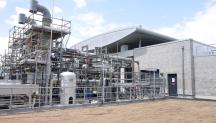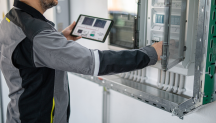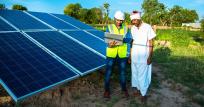
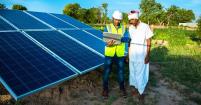
Energy Transition Policies to Maximise Socio-economic Benefits
Newsletter
IRENA supports its Members to deploy renewables and reap the full benefits of energy transition through integrated policies
COVID-19 has put a lot of pressure on the energy sector, but renewable energy has been shown to be resilient, providing clean, reliable, easy to mobilise and cost-effective energy solutions. IRENA’s Post-COVID recovery: An agenda for resilience, development and equality launched earlier this year shows that a recovery focused on the renewable-based energy transition path could generate beyond energy solutions, and lead to wide and numerous benefits for societies; improving energy access, healthcare and welfare. Recovery measures therefore must be based on ambitious plans for the deployment of clean energy technologies and aim to maximise the socio-economic benefits of an energy transition.
“Recovery measures therefore must be based on clean energy technologies and aim to maximise the socio-economic benefits of an energy transition.”
To support its Members in deploying renewables and reaping the full socio-economic benefits of the transition, IRENA emphasised the holistic approach of analysing the much-needed policies during a Programmatic Discussion with its Membership last week. Accelerating the energy transition by scaling up the deployment of renewable energy requires policies that create an enabling environment for attracting investments.
Decisive efforts are needed to mobilise significant investments that foster continued technology innovation and ensure a just transition that leaves no one behind. Through its Post-COVID Recovery report, IRENA laid out an achievable green recovery agenda that promises substantial GDP and employment gains, while providing rooms to suit the specific needs of each region and country. The agenda includes an annual investment of USD 2 trillion dedicated to the energy transition path between 2021 and 2023, which can create 5.5 million additional jobs in renewables.
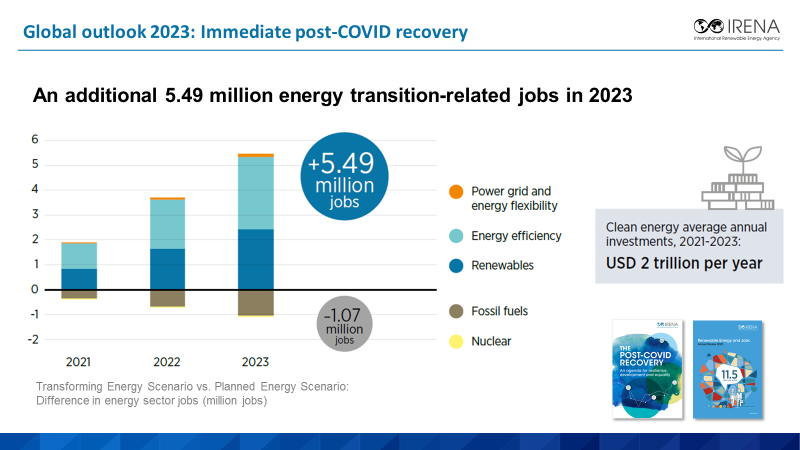
Stimulus packages must combine direct measures that support deployment, integrating policies to facilitate the greater integration of renewables into our energy systems, and enabling policies that establish the appropriate environment for the larger penetration of renewables. These measures combined can ensure the best energy transition outcome. Direct measures supporting deployment in all end-uses include fiscal and financial policies, push policies (e.g., quotas and obligations, mandates) and pull policies (e.g., regulatory and pricing policies such as FITs and auctions). One of the direct measures to mobilise investments that IRENA has been analysing is auctions. IRENA analysis shows that auctions have been adopted widely in the last decade as they can be designed to capture the falling costs of technologies while reaching wider objectives.
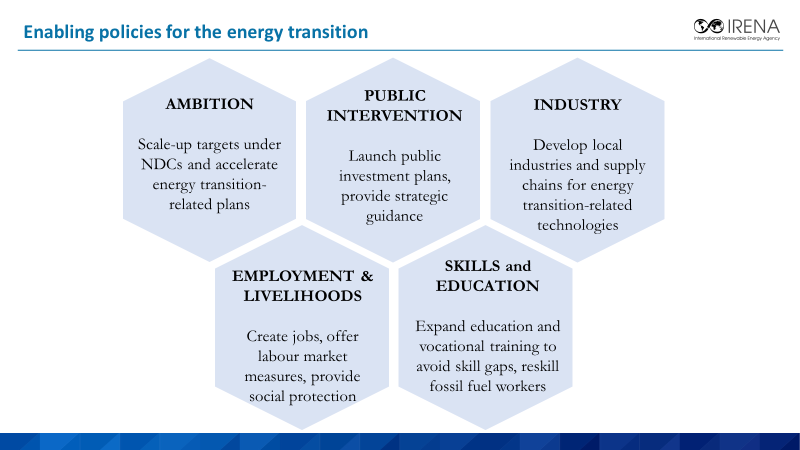
To create an inclusive economy built on green jobs, a balanced mix of policies in training and education, labour market and social protection should also be included in the equation.
Another element that has been revealed to be particularly important during COVID-19 is local industries. As countries experience disruptions in the supply of materials and workforce, domestic supply chains have proved to be very essential for the economies. Industrial policies are therefore crucial to strengthen local industries, consequently expanding benefits along all segments of value chains by leveraging local capacities to create domestic value—including jobs, healthcare, communications and local commerce--from deploying renewables.
“A holistic approach to accelerate a low-carbon economy should include enabling, deployment, and integrating policies that complement each other.”
It is clear that there is an interlinkage between energy transition roadmap and GDP, employment and welfare. Analysing the energy system to formulate effective policies should take into account the broader socio-economic structures upon which it is built and with which it interacts. A holistic approach to accelerate a low-carbon economy should include enabling, deployment and integrating policies that complement each other. Only with such approach can countries maximise the socio-economic benefits of energy transition while avoiding the misalignments it can generate.

